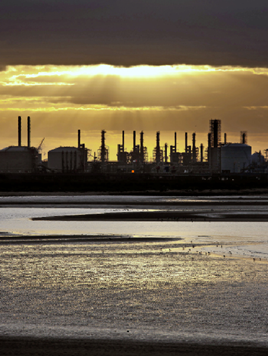Carne adds: “People often say safety is expensive. I think what is more expensive is doing a job badly. That is a hidden cost, and inefficiency leads to people getting hurt. If you have a safety culture, it means you start planning the job properly, having the right tools and doing the right thing.
“At Shell, the bottom line of this shareholder-focused business is that it must have the best worker safety of any oil company in the world. Shell is absolutely relentless at improving its safety performance, because it is a key means by which you improve the whole business. And when you’re trying to get new work, the calling card of being one of the safest businesses in the world really works. Shell’s footprint in China today is largely based on its outstanding safety record - the Chinese wanted to learn from Shell.”
“We are still trying to learn more about health management,” says ORR’s Prosser.
“Other sectors do it much better than us. This matters because the last time rail went through change this big was privatisation, when proper risk assessment of the change was not done. Asset knowledge was lost. This time it has to be proper analysis and assessed in detail. Are we trying to change too much at one time?
“You cannot break up rail’s safety function. It is a core capability. It would be wrong to put it in Network Rail or in an SRA Mk 2. They would be delivery agents, and it has to be independent from delivery.
“They can take me to the gallows over this. There are only two places for RSSB in the new structure: one is that it stays as it is, the only other feasible place it could go is inside the regulator.
“Otherwise the rest of the sector would not trust it. The unions already don’t trust RSSB because of the whole Driver Controlled Operation thing. It got too political. We have to build back the trust.
“It’s not broken. We have a poor-performing railway but very good safety performance. Restructuring introduces risk, just like introducing new trains induces risk. You have to mitigate those risks. That is the key to change.”
An industry in crisis?
“I think the industry is in crisis,” says Carne. “Never waste a crisis. A crisis is the time to shift the way things are done. The industry has to seize the moment.
“I believe the railway needs a new organisation at arm’s length from the Department for Transport - a much stronger central body removed from government to provide performance focus and to guide the government to the right investment decisions.”
Prosser agrees: “Getting railway management out of the Department for Transport is about moving it from a bunch of incompetents to an organisation that is actually competent. Part of the problem we face is the Department’s lack of expertise and lack of experience. And franchise bid teams rarely run the franchise, so they don’t learn either. So this is an opportunity.”
Porter says the whole management of the railway has to be streamlined.
“There are too many bodies. That is why the timetable change last year didn’t work. Look at all the moving parts within the system. It was almost ludicrous to think it could ever work!
“From a systems point of view, nobody looked at the whole. Nobody had a handle on system risk. They probably didn’t even know what it was.
“If I were Williams, I would take a deep breath and say we have to simplify this dramatically. We need a system operator for timetabling and so on. Well, actually, we need a Systems Authority. I wouldn’t let the Department for Transport be responsible for anything, apart from setting some high-level policy.
“I would then create the Systems Authority at the centre. It would have to be within Network Rail - the only place big enough, mean enough, funded well enough to do it. If you did that properly, you would not need an RDG, or RSSB.
Carne counters: “The reason why we set up the system operator in Network Rail was to provide an independent source of analysis to understand where the best places were to intervene to improve performance.
“It is now clear the role of that system operator needs to be expanded to include the day-to-day performance of the railway.”
Would that be within Network Rail?
“No, I don’t think we should use the current terminology to describe the future. That gets you into trouble very quickly. If you start with a blank sheet of paper, it does not have Network Rail, ORR or RSSB.”
Porter concludes: “We in the rail industry are like what I saw when I entered the oil and gas industry decades ago. It is impossible. The minute you reach an understanding with a train operator executive, they change. The Department is unbelievable. You have the same discussions over and over again, each time with a new person in the chair. They haven’t seen the data, they’ve only heard anecdotes. There is a churn of people who always think we are wrong.
“ORR never put economics and safety together. RAIB thinks everyone should implement every recommendation even when they cost three times what the railway has to spend.
“So: get Network Rail right. Get its board right. Get a system function in place and make it good. Then you will not need some of the other bodies. I wouldn’t even support the continuation of RSSB independently. It’s a systems function, so it needs to be in a systems body.”
Carne concludes: “Improving the performance of the railway as a whole is a critical enabler of driving the productivity of the country. In terms of the government’s priorities, changing the way the railway is run has to be really high up there. That’s what Williams needs to lead to.” ν














